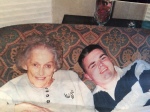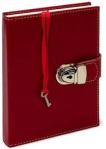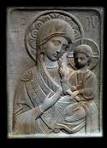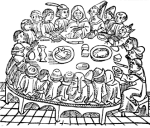Dear J. D. Vance,

Hillbilly Elegy
Thank you for Hillbilly Elegy. Your writing is so accessible and straightforward that as I read, I felt you were talking to me. But if you had been talking to me, you’d be the first Scots-Irish Rust Belter I’ve ever had the opportunity to converse with. I’m one of those coastally oriented urban liberals who doesn’t know many folks who don’t share her politics. So your book was an opportunity for me to hear from somebody who might help me understand all those angry unemployed white men I heard so much about during the recent presidential campaign. You gave a voice to a group of people I would otherwise never meet.
But I read your best-selling memoir not only to learn about you and others from the Rust Belt. I also read it to learn about memoir writing because I’d like to write one. I was immediately struck by the way you introduce yourself and your story: “My name is J. D. Vance, and I think I should start with a confession. . . .” You don’t “sound” like a hillbilly. You sound like an extremely reliable and smart narrator who’s taking me into his confidence from the get-go. Your professed openness and your simple vocabulary prepared me to read a memoir that is both credible and unpretentiously written.
Next you assure readers that you’re not telling your life story to chronicle something “extraordinary” that you’ve achieved. This was immediately reassuring to me because my life has not been extraordinary in either achievement or debacle, factors which, separately or together, fuel many memoirs. Instead, you explain that you are using your life story to illustrate how a kid from a poor and very screwed up family in a decaying steel town achieved something “quite ordinary” for many American

Yale Law School Logo
young people. You went to college, graduated, and got yourself accepted to Yale Law School in spite of obstacles neither I nor most of your classmates faced. You had considerable support from your less than perfect mom, your tough old-time grandparents and your sister. Their love fostered your aspiration to join the white collar work world which meant getting an education. So in that way you differed from many of the other kids in Middletown, Ohio. But even so, your path to college and grad school wasn’t easy.

Vance and Grandmother
You claim that you were able to accomplish what you did not because you are especially brilliant, but rather because this “handful of loving people rescued” you. These “loving people,” most notably your hillbilly grandparents, were hardly poster people for parenting a homeless teen. But those grandparents saw that you could not flourish in your mom’s care. She was addicted to pain killers and attracted a series of stepfathers each of whom you had to learn to love and then lose. So Mamaw and Papaw, stepped up and did the best they could. And you acknowledge that four years in the marines between college and law school helped too.

U. S. Marine /corps Logo
You mention the “spiritual and material poverty” of the community you grew up in. To contextualize this sad state, you trace the history of the Scots-Irish migration from Appalachia to the Midwest and the remarkable persistence of the values they brought with them such as loyalty and patriotism. But there are others, equally persistent. One of these is a historical preference for whiteness. Along with that goes a distrust of outsiders and/or those who appear different from themselves. Introspection is not highly prized, but being tough and willing to fight to defend one’s family is. You point out that a man will battle fiercely to defend the honor of his mom or his sister, and then, after marrying, he’ll cheat on his wife and joke about it with his buddies. At the recent Women’s March in Seattle, I thought of those wives.
Unlike many, you don’t think that having more manufacturing jobs is the silver bullet that will bring back the good times before the local steel mill closed. Rather you show how over the generations various factors, especially drug use and the resulting breakdown of families, contributed to the failure of many Scots-Irish to embrace the work

Closed Steel Mill
ethic they profess to hold dear. Unaccustomed to self-examination, when they are fired for not doing their jobs, they blame their bosses. “How could he fire me? I have a pregnant girlfriend!” Or they blame “outsiders” or the government. You comment on how a man has energy enough to sire eight kids, but not enough energy to work to support them.
Parents appear oblivious to the effect of their neglect, instability, and poverty on their children. You illustrate through your own story how difficult it is for a youngster to do well in school with no one to make him do his homework, let alone help him with it, with no quiet place in which to study, and with hunger and high level domestic drama as constants. And you note again that there persists also a stubborn refusal to examine one’s own behavior, accept responsibility for it, and try to change it.
Before I read Hillbilly Elegy, I assumed that many white Midwesterners in the Rust Belt were Evangelical Christians. But the folks you describe have drifted far from organized religion of any kind. You say that the churches they once attended were more judgmental than supportive, so when times got hard, their members turned to drugs or booze. But what unchurched Rust Belters have in common with many fundamentalists of any stripe is the almost inchoate realization that modernity─ globalization, diversity, feminism, technology, new jobs requiring new skills ─ threatens those enduring values they brought with them from Appalachia and which still seem to be the bulk of their belief system. And it is this culture that you expose and yet still identify with. For although you have gotten that education, the white collar position, the lawyer wife and the cherished kids who will never wonder where they are sleeping or who is the daddy of the month, you identify still as a hillbilly.
As a would-be memoirist, I envy you your underexposed background. Perhaps because not too many hillbillies write memoirs, your upbringing seems exotic and makes me almost wish my own tribe, Jews descended from immigrant Eastern European Jews, had not been chronicled quite so extensively. While Scots-Irish avoid self-examination, many of my landsmen (and women) have filled library and bookstore shelves with lengthy accounts of neuroses caused by their overly protective Jewish moms, by poverty or affluence, by immigration, or, of course, by antisemitism. I’ll have to find something unique in my own background or an especially intriguing way of describing it to justify my desire to leave behind yet another story of yet another nice Jewish girl.

J. D. Vance
In Hillbilly Elegy you explain why so many American white men feel left behind, forgotten, and frightened by the whirlwind of changes in our country and our world. Since their migration north, they seem incapable of taking any action of their own to adapt. They remind me a little bit of those Jews who refused to believe that the Nazis would invade the countries where these same Jews held respected positions and led gratifying lives. So they ignored the warnings of their relatives abroad and stayed in Europe until it was too late to leave. I hope Hillbilly Elegy inspires many of your friends and relatives to prepare themselves and their children for the world as it really is rather than for the one they would like to revive. This book is a great gift from you to them and to those of us seeking to understand them. It took great love of kin and country as well as great courage to write it. Thank you.
Sincerely,
Jane Isenberg









 classmates, our neighbors, and him and my mom. None of these outpourings upset him but I’d also penned a rather lurid entry listing things I wished to do with certain boys I knew. Alas, my dad believed I’d actually done them, or feared I might do them. It took me a long time to convince him otherwise and a lifetime to get over the dreadfulness of having my own secrets exposed to my beloved, but notoriously stern father. Did I mention that he had served as a municipal judge? His intrusion and his reaction to my fantasies put a heavy and durable damper on my urge to write down stuff I made up. It’s no co-incidence that I didn’t really begin writing for publication until after both of my parents died.
classmates, our neighbors, and him and my mom. None of these outpourings upset him but I’d also penned a rather lurid entry listing things I wished to do with certain boys I knew. Alas, my dad believed I’d actually done them, or feared I might do them. It took me a long time to convince him otherwise and a lifetime to get over the dreadfulness of having my own secrets exposed to my beloved, but notoriously stern father. Did I mention that he had served as a municipal judge? His intrusion and his reaction to my fantasies put a heavy and durable damper on my urge to write down stuff I made up. It’s no co-incidence that I didn’t really begin writing for publication until after both of my parents died.

 Dear Geraldine Brooks, Thank you for The Secret Chord. Your retelling of the life of King David interested me because I was eager to see how you, a Pulitzer Prize winning novelist
Dear Geraldine Brooks, Thank you for The Secret Chord. Your retelling of the life of King David interested me because I was eager to see how you, a Pulitzer Prize winning novelist 

 Century as well as the beginning of the Twenty-first. Natan used David’s epic story to make us see what life was like for women and men in biblical times. The phrase “biblical times” once made me think of robed people in the desert either getting a tablet of instructions from Charlton Heston or being crucified. Likewise I associated the word tribalism with certain outdated cultural practices and the current United States Congress. In David’s era, each tribe was an extended patriarchal family whose men were expected to defend it from attack and attack others to extend its reach. The king’s power was absolute. He inspired rivals including his own children. Thanks to your research, I now understand how and why fratricide, incest, infanticide, rape, murder, adultery, and theft all figured in David’s life.
Century as well as the beginning of the Twenty-first. Natan used David’s epic story to make us see what life was like for women and men in biblical times. The phrase “biblical times” once made me think of robed people in the desert either getting a tablet of instructions from Charlton Heston or being crucified. Likewise I associated the word tribalism with certain outdated cultural practices and the current United States Congress. In David’s era, each tribe was an extended patriarchal family whose men were expected to defend it from attack and attack others to extend its reach. The king’s power was absolute. He inspired rivals including his own children. Thanks to your research, I now understand how and why fratricide, incest, infanticide, rape, murder, adultery, and theft all figured in David’s life. Natan also hears from David’s other wives. According to Batsheva she is not the siren I learned about in Sunday school. She bathed on her roof not to tempt the king but to escape the leers of injured veterans her husband had invited to their home and given work. David sent soldiers for her, repeatedly and brutally raped her, and tossed her aside. She lived in fear of being stoned to death should her first husband, one of David’s generals, discover that she had dishonored him. David goes so far as to have that first husband killed. Batsheva also offers insight into how self-serving Natan’s attempt to defend David is, thus making the prophet human too. After calling David a monster, she tells Natan that “…you choose to look away from the truth. You let your love for him blind you.” So much for our “reliable” narrator!
Natan also hears from David’s other wives. According to Batsheva she is not the siren I learned about in Sunday school. She bathed on her roof not to tempt the king but to escape the leers of injured veterans her husband had invited to their home and given work. David sent soldiers for her, repeatedly and brutally raped her, and tossed her aside. She lived in fear of being stoned to death should her first husband, one of David’s generals, discover that she had dishonored him. David goes so far as to have that first husband killed. Batsheva also offers insight into how self-serving Natan’s attempt to defend David is, thus making the prophet human too. After calling David a monster, she tells Natan that “…you choose to look away from the truth. You let your love for him blind you.” So much for our “reliable” narrator!

 Dear William Shakespeare,
Dear William Shakespeare, Back then I didn’t know what an Elizabethan was nor did I understand Elizabethan English. The foibles of long dead Roman politicos, suicidal teens, and British monarchs did not interest me. Neither did poetry. Scarlett O’Hara interested me. Marjorie Morningstar interested me. The denizens of Peyton Place got my attention too. So although I’d always read a lot, I wasn’t a versatile or particularly adventuresome reader.
Back then I didn’t know what an Elizabethan was nor did I understand Elizabethan English. The foibles of long dead Roman politicos, suicidal teens, and British monarchs did not interest me. Neither did poetry. Scarlett O’Hara interested me. Marjorie Morningstar interested me. The denizens of Peyton Place got my attention too. So although I’d always read a lot, I wasn’t a versatile or particularly adventuresome reader.

 Even though I love theater, I’d rather read your plays than see them on film or on the stage. I want to interpret your words and imagine your people myself rather than get an impression filtered through the sensibilities of a director and an actor. I’m sure that the close attention I learned to pay to how aptly you word the conversations and asides of complex characters has made me a better writer.
Even though I love theater, I’d rather read your plays than see them on film or on the stage. I want to interpret your words and imagine your people myself rather than get an impression filtered through the sensibilities of a director and an actor. I’m sure that the close attention I learned to pay to how aptly you word the conversations and asides of complex characters has made me a better writer. women and writers of other colors and ethnicities to our literature curriculums. I do hope your plays remain on stages, on film, and, most importantly, on syllabi. Here in Washington State where some college curriculums have been especially slow to embrace inclusiveness, students are demanding more works by women and writers of color and of diverse backgrounds. I hope the students prevail, but I also hope an expanded canon continues to include your plays. Although you were white and male, and are, sadly, dead, your dramas are alive and, especially in this post-Brexit era, still have much to teach us all.
women and writers of other colors and ethnicities to our literature curriculums. I do hope your plays remain on stages, on film, and, most importantly, on syllabi. Here in Washington State where some college curriculums have been especially slow to embrace inclusiveness, students are demanding more works by women and writers of color and of diverse backgrounds. I hope the students prevail, but I also hope an expanded canon continues to include your plays. Although you were white and male, and are, sadly, dead, your dramas are alive and, especially in this post-Brexit era, still have much to teach us all. Dear Roz Chast,
Dear Roz Chast,


 What did surprise me and made this book especially meaningful to me is your ability to share your ambivalent feelings about your mom. For many the word family conjures up an almost sacred institution. And what kind of monster doesn’t love her mom, right? No matter what. So your acknowledgement of your lifelong struggle to bond with your mother is daring yet familiar and welcome. Even after she has died, you tell us that you’re “still working things out” with her and, to me, still embarked on a similar project, this book seems part of that effort.
What did surprise me and made this book especially meaningful to me is your ability to share your ambivalent feelings about your mom. For many the word family conjures up an almost sacred institution. And what kind of monster doesn’t love her mom, right? No matter what. So your acknowledgement of your lifelong struggle to bond with your mother is daring yet familiar and welcome. Even after she has died, you tell us that you’re “still working things out” with her and, to me, still embarked on a similar project, this book seems part of that effort. and hearts of those who come after us. We live on as memories. So George and Elizabeth Chast survive in their daughter’s memory and now, in the memories of those of us with whom you have honestly and brilliantly shared their story and your own.
and hearts of those who come after us. We live on as memories. So George and Elizabeth Chast survive in their daughter’s memory and now, in the memories of those of us with whom you have honestly and brilliantly shared their story and your own. Thank you for writing Portrait of the Artist as a Young Man
Thank you for writing Portrait of the Artist as a Young Man 


 As a Nice Jewish Girl reared in the Fifties, I knew I wasn’t supposed to get pregnant before I married, so I wasn’t supposed to have sex. If I did have sex, the guy I had it with would probably dump me for a more virginal bride. And if I got pregnant, well, that would be just awful. I might have to have an abortion, secretly arranged by my parents. Or my baby might have to be put up for adoption. I would live out my life in disgrace. And, worst of all, no one would want to marry me. Ever. But these punishments were rarely mentioned and quite tame compared to those Stephen contemplated every time he felt a little horny. I do wonder what he (and you) would make of the many child molesters outed among the Catholic clergy in recent years. I wonder if that sort of thing was going on in the schools Stephen attended.
As a Nice Jewish Girl reared in the Fifties, I knew I wasn’t supposed to get pregnant before I married, so I wasn’t supposed to have sex. If I did have sex, the guy I had it with would probably dump me for a more virginal bride. And if I got pregnant, well, that would be just awful. I might have to have an abortion, secretly arranged by my parents. Or my baby might have to be put up for adoption. I would live out my life in disgrace. And, worst of all, no one would want to marry me. Ever. But these punishments were rarely mentioned and quite tame compared to those Stephen contemplated every time he felt a little horny. I do wonder what he (and you) would make of the many child molesters outed among the Catholic clergy in recent years. I wonder if that sort of thing was going on in the schools Stephen attended.

 Another issue you discuss is one that has come up often in my writing group: the likeability of the protagonist. When one of us creates a main character who is less than endearing, let alone who is despicable, there’s pushback. But you cite extremely fine authors who have put some nasty folks on the pages of their work, and so you remind us that the “rules” that are said to define good writing don’t always do that.
Another issue you discuss is one that has come up often in my writing group: the likeability of the protagonist. When one of us creates a main character who is less than endearing, let alone who is despicable, there’s pushback. But you cite extremely fine authors who have put some nasty folks on the pages of their work, and so you remind us that the “rules” that are said to define good writing don’t always do that.

















































 a wrenching read, an up-close and personal look at four generations of a Midwestern Jewish family, the decisions they made, and the choices that remain to them. I loved ex-attorney Edie Middlestein’s wit and warmth, and the kindness she extended to friends and the less fortunate, but I didn’t want to be her. That’s because she deals with losses─ her beloved father, her faith, her role as do-gooder, her law career, and, finally, her husband─ by bitching at said husband and overeating until, at sixty, she is a full-blown fat lady needing vascular surgery twice in one year. If this sounds like I think your book is a late-night commercial for diet pills or gastric surgery, I don’t. In this novel you join the exalted ranks of authors who chronicle the Jewish mother’s metamorphosis from overprotective immigrant Sophie Portnoy to the very American morbidly obese, diabetic Edie Middlestein.
a wrenching read, an up-close and personal look at four generations of a Midwestern Jewish family, the decisions they made, and the choices that remain to them. I loved ex-attorney Edie Middlestein’s wit and warmth, and the kindness she extended to friends and the less fortunate, but I didn’t want to be her. That’s because she deals with losses─ her beloved father, her faith, her role as do-gooder, her law career, and, finally, her husband─ by bitching at said husband and overeating until, at sixty, she is a full-blown fat lady needing vascular surgery twice in one year. If this sounds like I think your book is a late-night commercial for diet pills or gastric surgery, I don’t. In this novel you join the exalted ranks of authors who chronicle the Jewish mother’s metamorphosis from overprotective immigrant Sophie Portnoy to the very American morbidly obese, diabetic Edie Middlestein.
































































 spaces are fewer and farther apart. The Coulee River is being damned and the native tribes are retreating to smaller and more remote allotments of land. Religious zealots of all sorts are turning up along with loonies, eccentrics, and survivalists. And these disparate folks mingle with decidedly disastrous results. Strawl adopts an Indian boy who, upon exposure to Catholicism, becomes a self-anointed prophet attracting followers into a mountain encampment that makes Waco, TX look like a Zen spa. Just as the dam subdues the Coulee, cars, trains, and trucks replace horses, and towns form where once there was only a settler or two. Thanks in part to
spaces are fewer and farther apart. The Coulee River is being damned and the native tribes are retreating to smaller and more remote allotments of land. Religious zealots of all sorts are turning up along with loonies, eccentrics, and survivalists. And these disparate folks mingle with decidedly disastrous results. Strawl adopts an Indian boy who, upon exposure to Catholicism, becomes a self-anointed prophet attracting followers into a mountain encampment that makes Waco, TX look like a Zen spa. Just as the dam subdues the Coulee, cars, trains, and trucks replace horses, and towns form where once there was only a settler or two. Thanks in part to 































































